Search the Special Collections and Archives Portal
Search Results
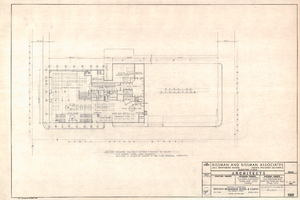
Binion's Horseshoe 1st Floor Plan: architectural drawing
Date
Archival Collection
Description
From the Homer Rissman Architectural Records (MS-00452). Written on the image: "Rissman and Rissman Associates 1011 Swarthmore Avenue Pacific Palisades California Gladstone 4-7519. Scale 1"=20'-0". Architects. Mechanical Engineer W.L. Donley & Associates 1516 North West Avenue Fresno, Calif. 93728 268-8029. Electrical Engineer J. L. Cusick & Associates 4219 Lankershim Blvd. North Hollywood, Cal. 91602 Triangle 7-6231. 2-7-68 Date. Additions & Alterations. Binion's Horseshoe Hotel & Casino 200 Fremont Street Las Vegas Nevada, 89101. Phone: 702/382-1600. First Floor Plan".
Image
Tamara Pickett Papers
Identifier
Abstract
The Tamara Pickett Papers (1977-1998) are comprised of materials related to the experiences of transgendered individuals in America. The collection includes transgender publications, scientific articles about sex reassignment surgery, and informational material provided to Pickett from various doctors as she planned her own sexual reassignment surgery.
Archival Collection
Ellen B. Jensen Papers
Identifier
Abstract
The Ellen B. Jensen papers comprise the research notes, drafts with edits, carbons, and articles written by the Las Vegas, Nevada journalist Ellen Jensen who was the editor of and writer for the monthly Las Vegas Review Journal Jr. and writer for the Las Vegas Sun ("Sunday Scene") and Las Vegas Review Journal ("The Nevadan") from 1966 to 1969. Jensen wrote about many topics of interest to Las Vegans, including travel and recreation in southern Nevada, hotel and casino administration and construction, and local nightlife and entertainment.
Archival Collection
Downtown Las Vegas Design Drawings
Identifier
Abstract
The Downtown Las Vegas Design Drawings (approximately 2011-2014) is comprised of seven design drawings created for select businesses located in downtown Las Vegas, Nevada. The drawings are colored on tissue and were created by BUNNYFiSH studio, an architectural firm located in downtown Las Vegas, Nevada. The collection includes three drawings for a porte-cochère at the D Las Vegas hotel; drawings for the exteriors of the Hydrant Club, Inspire, and HOP Downtown; and an interior drawing for Scullery.
Archival Collection
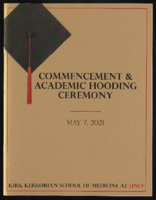
Kirk Kerkorian School of Medicine at UNLV 1st Commencement and Academic Hooding Ceremony
Date
Archival Collection
Description
Commencement program from University of Nevada, Las Vegas Commencement Programs and Graduation Lists (UA-00115).
Text
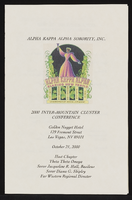
Alpha Kappa Alpha Sorority Inter-Mountain Cluster conference fliers
Date
Archival Collection
Description
From the Alpha Kappa Alpha Sorority, Incorporated, Theta Theta Omega Chapter Records (MS-01014) -- Chapter records file.
Text
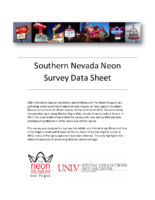
Poker Palace Neon Survey document, August 23, 2017
Date
Archival Collection
Description
Site address: 2757 N Las Vegas Blvd
Sign owner: Marvin and Laura Coleman
Sign details: This location opened 1974 with a castle theme. This location is also claimed as a locals casino. In 2015 their main pylon roadside sign caught on fire, but it was recently replaced.
Sign condition: 4- the signs that were not in the fire are still in relatively good condition
Sign form: Two pylons and architectural sign
Sign-specific description: The building itself has many different neon signs on it mostly red neon. Also the buildings architecture matches the palace theme. There are two pylon signs the first one states "Poker Palace Bingo" in channeled neon letters, then below is a reader board. The second pylon is just north a little of the first one, this is the one that caught on fire in 2015. After the fire the beam bases of the sign remained. This sign has "Poker Palace Casino" in red channeled letters.
Sign - type of display: Neon and incandescent
Sign - media: Steel and plastic
Sign - non-neon treatments: Reader board
Sign animation: Flasher for incandescent light bulbs.
Sign environment: This is located in North Las Vegas in a residential area and by a few other small businesses.
Sign - date of installation: Late 2015/ early 2016 for new pylon sign, others look to be older
Sign - date of redesign/move: 2015 pylon sign went up in flames and was destroyed, then replaced
Sign - thematic influences: The building looks like a palace which goes with their names and theme. Also their signs showcases similar shapes to the building.
Survey - research locations: Poker Palace website http://pokerpalace.net/History.html , Images of sign , Review Journal article https://www.reviewjournal.com/local/local-las-vegas/nlv-casino-marquee-fire-sends-up-plume-visible-for-miles/
Surveyor: Wyatt Currie-Diamond
Survey - date completed: 2017-08-23
Sign keywords: Architectural; Neon; Incandescent; Steel; Plastic; Flashing; Reader board; Pylon; Fascia
Text
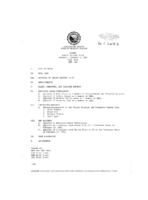
Meeting minutes for Consolidated Student Senate University of Nevada, Las Vegas, February 7, 1991
Date
Archival Collection
Description
Text

Transcript of interview with Dr. John Shepherd by Lisa Gioia-Acres, November 21, 2008
Date
Archival Collection
Description
Dr. John Richard Shepherd shares the background of his early life in southern Illinois, his father's and grandfather's occupations, and his educational journey through college and medical school. His army experiences in Chicago and Alabama convinced him and his wife to look for a warm dry climate in which to live, and they relocated to Las Vegas in 1968. Dr. Shepherd recalls the businesses and housing surrounding Sunrise Hospital, the difficulties getting his specialty listed in the phone book, and renting his first office space from Nate Adelson. He also describes taking out a loan to install ophthalmology equipment, hiring an office manager with medical accounting experience, and doing cataract surgery in a way that basically hadn't changed for decades. The passing of the Medicare bill back in 1966 caused Dr. Shepherd's practice to build up quickly. He details the many ways eye surgery changed, including the invention of the intraocular lens and the phacoemulsification procedure. He mentions his and Dr. Shearing's contributions to ophthalmology — better designed lenses and surgical techniques - which they taught to other doctors from all over the country. Dr. Shepherd discusses radial keratotomy, which was a precursor to laser and later LASIK surgery, and describes a lens implant technique he learned in Russia from Dr. Fyodorov. He goes on to share anecdotes and stories of his interactions with patients, his travels as a consultant and as a surgical teacher for Project Orbis, and meeting Fidel Castro. He speaks candidly about his successes and his failures as well. Dr. Shepherd retired in 2006 and immediately enrolled in a Master's program and earned a degree in military history. After a long and distinguished career, after receiving many accolades and awards, he and his wife are enjoying life, splitting their time between Sun Valley, Idaho, and Las Vegas.
Text

Interview with Richard Van Nutley, November 8, 2004
Date
Archival Collection
Description
Text
